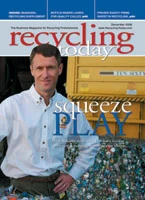BIR RELEASES
ESM COMPLIANCE
PUBLICATION
During its fall conference in late October, the Bureau of International Recycling (BIR), based in Brussels, released a publication designed to assist recovery and recycling companies in implementing an ISO-compliant environmental management system with integrated OECD (Organization for Economic Cooperation and Development) Core Performance Elements.
"Tools for Environmentally Sound Management" is available free to recovery and recycling companies via the BIR Web site at www.bir.org. It is intended to be user-friendly, with the basic elements of ISO 14001 fitting with any already developed national system, according to BIR.
BIR’s Environmental & Technical Director Ross Bartley says "Tools for Environmentally Sound Management" integrates the OECD Core Performance Elements and, therefore, complements the different ESM systems in place in different countries.
Bartley added that guidelines would be published shortly on the environmentally sound management of used and end-of-life mobile phones as part of the Basel Convention Partnership Program.
BIR International Environment Council Chairman Alvaro Rodriguez said, "In an increasingly complex world, one of the tasks of BIR is to provide easily useable tools to help recycling companies demonstrate that they are working in an environmentally sound way."
The BIR also is lobbying for secondary raw materials to be left outside of the scope of REACH (Registration, Evaluation, Authorization and Restriction of Chemicals), a new European Union policy. Taking ferrous scrap as his example, Bartley suggested this material should not be covered by REACH because it represents "an intermediate" that is used to produce another substance and is destined for an IPPC (International Plant Protection Convention) installation, namely a steel mill, and because ferrous scrap competes with iron ore, which is not covered under REACH.
During the International Environmental Council meeting, Robin Wiener, president of the Institute of Scrap Recycling Industries (ISRI), confirmed that a recently signed Memorandum of Understanding would usher in the first-ever national mercury switch removal program. The automotive and steel industries had agreed to contribute in equal measure to a $4 million fund, from which dismantlers and recyclers would be paid $1 for each switch recovered. Rollout of the program is expected to begin in early 2007.
Ruggero Alocci of Assofermet in Italy noted that, after a long wait, new national waste legislation was introduced in April of 2006. However, following a change of government in Italy, waste regulations were to come under further review; thereby, opening up the possibility of another shift in the definition of secondary raw materials, he said.
SCRAP TIRES ON EU RADAR SCREEN
Scrap tires are on the priority list of end-of-life streams the Environment Committee of the European Parliament will study, according to Barend Ten Bruggencate of VACO in the Netherlands, who also chairs the BIR Tyres Round-Table.
Ten Bruggencate told attendees of the fall Round-Table in Brussels that this acknowledges their importance as a material stream.
Figures indicate that many Western European countries are achieving a 100 percent recovery rate for used tires via a number of routes. But many of the newer EU member states have been struggling to make progress and would need help from those with experience, he said. Funds are available from the EU’s research budget to develop collection and recycling infrastructures in these countries, he added.

Explore the December 2006 Issue
Check out more from this issue and find your next story to read.
Latest from Recycling Today
- C&D World 2025 hits record attendance and exhibitor numbers
- Denali now offers mobile depackaging service
- Hyundai confirms Louisiana as EAF mill site
- ASCE sees infrastructure progress, but more to be done
- Global steel output tapers downward
- NWRA announces 2025 Driver of the Year, Operator of the Year winners
- The Scrap Show: Nanci Schuld of FE Trading Group LLC
- Call2Recycle Canada partners with RLG to advance battery collection






